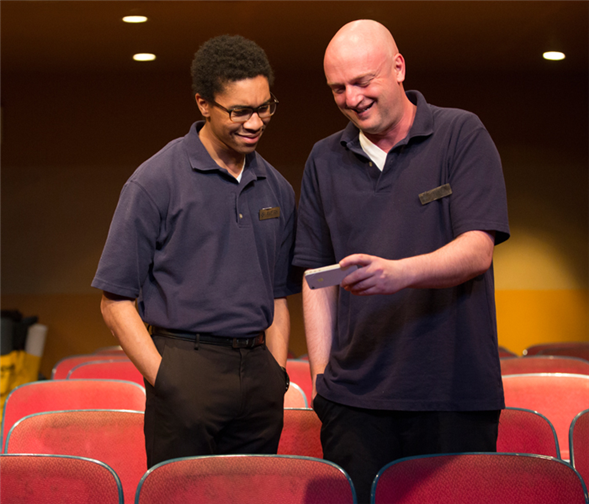Translate Page

The secret structure of The Flick
---
The Flick is not, in fact, a documentary.
Granted, Annie Baker's play – which won last year's Pulitzer Prize and is now at the Barrow Street Theatre after an earlier run at Playwrights Horizons – certainly seems like a slice of life. As three employees of a Massachusetts movie theatre go about their business, sweeping up popcorn and debating the merits of Avatar, they look and sound "natural." Thanks to the gum on the seats and the water-stained ceiling tiles, their world looks natural, too. You can imagine an actual movie house that's just like this one.
What's more, The Flick has no interest in splashy action. This is not a play where the concession guy starts a fistfight or bank robbers storm the projection booth. Instead, superficial conversations get wrapped around minimum-wage work, and people are just as likely to do their jobs in silence as they are to make small talk. That's another reason it's tempting to call the show "realistic."Whatever it makes us consider, it's hard to experience The Flick without ultimately appreciating how structured it is, how carefully and elegantly designed.
"Even though the play appears naturalistic, every nanosecond is planned," says Matthew Maher, who plays Sam, a guy in his mid-thirties with a hopeless crush on his co-worker and a mounting fear that he'll never get promoted. "Every move, and even the thoughts that we're having in the pauses, has been considered. The director, Sam Gold, has said it has sort of a balletic quality."
In other words, everyone works hard to make The Flick feel spontaneous. For Maher, that's the only way to craft a believable performance. "Sometimes when I see a play where it's just actors doing their thing, following their impulses, those plays feel really contrived," he says. "Whenever I'm in those plays, I feel like such a phony. 'Oh, I'm just up here following my impulses.' There's a paradox there about rigor letting you loose into a kind of freedom.'"
In fact, the more he masters The Flick's form, the more he uncovers in his character.
Take Sam's lengthy monologue about visiting his family, in which he describes leaving a sack of tamales behind on a movie theatre floor. Rehearsals for Barrow Street gave Maher a fresh perspective on what that speech accomplishes.
"We started calling them 'a cup of coffee run-throughs,' because I'd be standing there with a cup of coffee and just sort of rattling through the monologue," he says. "And Sam [Gold] would say, 'That's the best rendition of that monologue I've heard.'
"So I've been trying to hold on to that banter-y quality of just, 'Yeah, we're talking-talking-talking' until, boom, there's one moment where it's like, 'Ah, yes. This is the thing that actually kills me.' In the early days of previews at Playwrights, I was thinking, 'It's a big speech where I have to make all these transitions. Here's a point. Here's a point. Here's a point.' Now, the moment that the speech is actually about is clearer to me."Maher continues, "I actually take great comfort in that. Within the formal structure, you have to live and exist, so it's still really different every night."
---
Mark Blankenship is the editor of TDF Stages
Photos by Joan Marcus. Top photo: Aaron Clifton Moten and Matthew Maher